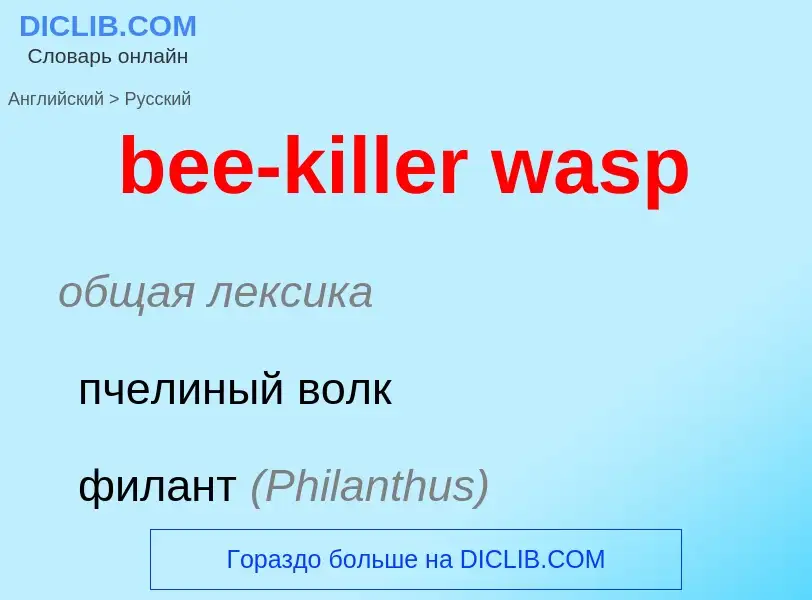Traducción y análisis de palabras por inteligencia artificial ChatGPT
En esta página puede obtener un análisis detallado de una palabra o frase, producido utilizando la mejor tecnología de inteligencia artificial hasta la fecha:
- cómo se usa la palabra
- frecuencia de uso
- se utiliza con más frecuencia en el habla oral o escrita
- opciones de traducción
- ejemplos de uso (varias frases con traducción)
- etimología
bee-killer wasp - traducción al ruso
общая лексика
пчелиный волк
филант (Philanthus)
роющие осы
питающиеся пчёлами
общая лексика
пчела-убийца
[wɔsps]
общая лексика
"Уоспс" (регбийный клуб; находится в графстве Мидлсекс. Основан в 1867)
дословная передача
осы
Definición
Wikipedia

Beewolves (genus Philanthus), also known as bee-hunters or bee-killer wasps, are solitary, predatory wasps, most of which prey on bees, hence their common name. The adult females dig tunnels in the ground for nesting, while the territorial males mark twigs and other objects with pheromones to claim the territory from competing males.
As with all other sphecoid wasps, the larvae are carnivorous, forcing the inseminated females to hunt for other invertebrates (in this case bees), on which she lays her eggs, supplying the larvae with prey when they emerge. The adults consume nectar from flowers.
The prevalent European species, P. triangulum, specializes in preying upon honey bees, thus making it a minor pest for beekeepers. Other Philanthus may specialize in other bee species or they may be generalists which prey upon a wide variety of bees such as the American bumblebee, Bombus pensylvanicus, or other hymenopterans, including conspecifics.
They are notable for stinging their prey in a membranous location on the ventral surface, where the venom quickly paralyzes major voluntary muscles, yet does not kill the prey. The prey may attempt to sting in return, but it is always grabbed in such a way that only well-armored portions of the beewolf's body are presented. The beewolf carries its prey back to a tunnel, but usually only stores it temporarily, until it is later used to provision a cell burrow, where an egg is laid.
The tunnel of Philanthus triangulum can be as much as 1 m long. The first part of the tunnel slopes downward at an angle of 30°, after which it levels out. Up to 34 lateral tunnels, each ending in a brood chamber, branch off from the main tunnel. Each brood chamber is stocked with one to six honeybees.



.jpg?width=200)
![[[European beewolf]] carrying a honeybee to its tunnel [[European beewolf]] carrying a honeybee to its tunnel](https://commons.wikimedia.org/wiki/Special:FilePath/bee wolf.jpg?width=200)
![''[[Philanthus gibbosus]]'' ''[[Philanthus gibbosus]]''](https://commons.wikimedia.org/wiki/Special:FilePath/Philanthus gibbosus, female,-face 2012-07-31-20.20.35-ZS-PMax.jpg?width=200)
![''[[Philanthus gibbosus]]'' ''[[Philanthus gibbosus]]''](https://commons.wikimedia.org/wiki/Special:FilePath/P. gibbosus57306787w.jpg?width=200)

![An Africanized honey bee hive on [[Gila River Indian Community]] land An Africanized honey bee hive on [[Gila River Indian Community]] land](https://commons.wikimedia.org/wiki/Special:FilePath/Africanized honey bee hive.jpg?width=200)
![Engelmann's prickly pear]] in the [[Mojave Desert]] Engelmann's prickly pear]] in the [[Mojave Desert]]](https://commons.wikimedia.org/wiki/Special:FilePath/Creation-Via-Pollination.jpg?width=200)



.jpg?width=200)
![1880}}, one of nine [[Royal Navy]] warships to bear the name 1880}}, one of nine [[Royal Navy]] warships to bear the name](https://commons.wikimedia.org/wiki/Special:FilePath/HMS Wasp (1880).jpg?width=200)
![''[[Polistes]]'' sp., India ''[[Polistes]]'' sp., India](https://commons.wikimedia.org/wiki/Special:FilePath/Indian yellow wasp.jpg?width=200)
![Male ''[[Electrostephanus petiolatus]]'' fossil from the [[Middle Eocene]], preserved in [[Baltic amber]] Male ''[[Electrostephanus petiolatus]]'' fossil from the [[Middle Eocene]], preserved in [[Baltic amber]]](https://commons.wikimedia.org/wiki/Special:FilePath/Neotype male of Electrostephanus petiolatus Brues in Baltic amber (AMNH B-JWJ-260).png?width=200)
![[[Wasp waist]], c. 1900, demonstrated by [[Polaire]], a French actress famous for this [[silhouette]] [[Wasp waist]], c. 1900, demonstrated by [[Polaire]], a French actress famous for this [[silhouette]]](https://commons.wikimedia.org/wiki/Special:FilePath/Polaire, French actress 5.jpg?width=200)
![European hornet, ''[[Vespa crabro]]'' European hornet, ''[[Vespa crabro]]''](https://commons.wikimedia.org/wiki/Special:FilePath/Vespa crabro09(js), Lodz(Poland).jpg?width=200)
![Bembix oculata]]'' ([[Crabronidae]]) feeding on a fly after paralysing it with its sting Bembix oculata]]'' ([[Crabronidae]]) feeding on a fly after paralysing it with its sting](https://commons.wikimedia.org/wiki/Special:FilePath/Wasp August 2007-23.jpg?width=200)

![''[[Megarhyssa macrurus]]'', a parasitoid. The body of a female is 50mm long, with a c. 100mm ovipositor ''[[Megarhyssa macrurus]]'', a parasitoid. The body of a female is 50mm long, with a c. 100mm ovipositor](https://commons.wikimedia.org/wiki/Special:FilePath/Ichneumon_wasp_(Megarhyssa_macrurus_lunato)_(7686081848).jpg?width=200)
![mutualistic]]. mutualistic]].](https://commons.wikimedia.org/wiki/Special:FilePath/CSIRO ScienceImage 11188 Fig wasp.jpg?width=200)
![Latina rugosa]]'' planidia (arrows, magnified) attached to an ant larva; the [[Eucharitidae]] are among the few parasitoids able to overcome the strong defences of ants. Latina rugosa]]'' planidia (arrows, magnified) attached to an ant larva; the [[Eucharitidae]] are among the few parasitoids able to overcome the strong defences of ants.](https://commons.wikimedia.org/wiki/Special:FilePath/Latina rugosa planidia.png?width=200)
![The [[Chrysididae]], such as this ''[[Hedychrum rutilans]]'', are known as cuckoo or jewel wasps for their parasitic behaviour and metallic [[iridescence]]. The [[Chrysididae]], such as this ''[[Hedychrum rutilans]]'', are known as cuckoo or jewel wasps for their parasitic behaviour and metallic [[iridescence]].](https://commons.wikimedia.org/wiki/Special:FilePath/Goudwesp.jpg?width=200)
![provisioning]] her nest with a honeybee provisioning]] her nest with a honeybee](https://commons.wikimedia.org/wiki/Special:FilePath/Bee wolf.jpg?width=200)
![Batesian mimic]] of wasps. Batesian mimic]] of wasps.](https://commons.wikimedia.org/wiki/Special:FilePath/Clytus arietis (Linné, 1758) (3989861203).jpg?width=200)
![Bee-eaters such as ''[[Merops apiaster]]'' specialise in feeding on bees and wasps. Bee-eaters such as ''[[Merops apiaster]]'' specialise in feeding on bees and wasps.](https://commons.wikimedia.org/wiki/Special:FilePath/Pair of Merops apiaster feeding detail.jpg?width=200)
![insect pest]] of tomato and other horticultural crops. insect pest]] of tomato and other horticultural crops.](https://commons.wikimedia.org/wiki/Special:FilePath/Encarsia formosa, an endoparasitic wasp, is used for whitefly control.jpg?width=200)

